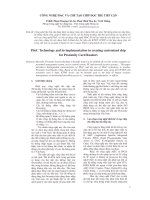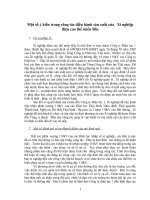The Ethical Way doc
Bạn đang xem bản rút gọn của tài liệu. Xem và tải ngay bản đầy đủ của tài liệu tại đây (105.03 KB, 18 trang )
The Ethical Way
Farrell, Joseph
Published: 1958
Categorie(s): Fiction, Science Fiction, Short Stories
Source: />1
Copyright: Please read the legal notice included in this e-book and/or
check the copyright status in your country.
Note: This book is brought to you by Feedbooks
Strictly for personal use, do not use this file for commercial purposes.
2
Transcriber's Note:
This etext was produced from Galaxy Science Fiction March 1958. Ex-
tensive research did not uncover any evidence that the U.S. copyright on
this publication was renewed.
3
"I
s it time?" Jarth Rolan asked anxiously. Pilot Lan Barda pushed
him gently back into a seat. "No, but very soon. And be
calm—you're jumpier than a human."
"But we've waited so long—yes, a long time. And I am anxious to get
home."
Lan peered calmly out of his vehicle. They were hovering in Earth's
upper atmosphere, at the permitted limit.
"Be patient. These people have almost reached the critical point. We'll
get the signal before long."
Jarth Rolan popped out of his chair and danced about in nervous
excitement.
"Won't it be dangerous? For us, I mean. Going down into that radioact-
ive atmosphere. And how about them—will any of them live? Suppose
we wait too long?"
Lan Barda laughed. He was a husky humanoid, pinkish of skin and
completely hairless, like all galactics. He slapped Jarth Rolan's back.
"We have experts watching. These humans have used four cobalt
bombs, and plenty of smaller stuff. The fallout is close to the danger
point. Our observers will know just when we can move in because—" he
winked and his voice dropped to a conspiratorial whisper—"they're us-
ing automatically controlled instruments."
"Oh, my!" Jarth Rolan clapped his hands to his cheeks. "But those are
robots—and the use of robots is against religion."
"I know, Jarth. But we won't be using them much longer, will we?" He
poked a playful finger into Jarth's ribs. "We'll have slaves—and it'll be
completely ethical."
Jarth Rolan winced. "Must you use that word 'slaves,' Lan? It sounds
so—" He waved his hands.
Lan laughed again. "Be honest with yourself, Jarth. You're out to make
a few dopolins for yourself as a slave raider."
"An entrepreneur," said Jarth. "In personal services."
Lan Barda became serious. "There's the signal—it's time to go down.
Let's go, Jarth, before somebody else gets them all."
A
n hour later, it was Lan Barda's turn to be nervous. He watched a
needle creep into the red zone.
"Hurry, Jarth. We've been on this planet long enough. That fifth cobalt
bomb is sending the index up fast. Can't you skip these last few?"
"Oh, no. Very unethical to leave these three here to die. Must take a
small chance, you know. Besides, see the sign on that taxi—just married.
4
A fine young couple. And a fine young taxi driver. Couldn't sleep if I
didn't help these three."
"Couldn't sleep thinking of the profit you'd passed up. Here, let me
take that one. We have to get out of here fast."
Jarth Rolan fluttered anxiously about the pilot until they were safely
above the poisoned atmosphere.
"How many?" he asked. "Did we fill the ship?"
Lan Barda checked off items on his clipboard. "A thousand and three,
with these last ones. You'll make a good profit."
"Not so much the profit. Oh, no. More than that involved. Ethics and
religion, Lan. Yes. With all these sla—servants, our people will never
have to use robots. They'll be relieved of routine labor and can devote
their lives to art and science. And it's all ethical—oh, yes, for these
people were doomed."
"Want to know something, Jarth?" Lan Barda bent closer and
whispered wickedly. "This ship has automatic controls. Has to. No living
being has fast enough reactions to handle an interstellar ship. All robot
driven, at least in part."
"Robots! May we be forgiven!" Jarth stared suspiciously at Lan Barda.
"Sometimes, Lan, I think you are an agnostic."
The pilot became more serious. "Maybe, Jarth. In our work, we must
use robots. We joke about it, but it goes against all galactic belief to let a
machine think for us. Maybe that's why we pilots are so cynical."
"A galactic is always ethical," said Jarth Rolan solemnly. "This affair,
for example. We let these poor creatures of Earth handle their own af-
fairs with no interference until they doomed themselves. It was unethical
to intervene a minute sooner. Yes—the ethical way and I feel better for it
and proud to be a galactic."
"That's true," said Lan Barda. "A galactic wouldn't feel right, being a
member of the dominant race of the Galaxy, if he didn't help the less
fortunate."
J
arth Rolan had prepared a center on his estate for the slaves. The de-
mand was greater than the supply. He chatted happily with his wife.
"An excellent investment, Shalla—yes. And the highest group council
wants us to lease them out by the day for the present instead of selling
outright."
She nodded. "That's the fair way. Everybody can have a turn having a
slave."
5
"And," said Jarth, rubbing his pink hands, "we'll collect every day and
still hold title."
"Will they multiply fast," asked Shalla, "so there will be enough for
all?"
"They always did on Earth. Yes. By the time we pass our estate on to
our son, this investment will have multiplied in value."
At the center, the slaves clustered about the bulletin boards to read the
slave code. The three who had been brought aboard last stood together.
Laurent Crotier and his wife Jean were still in their wedding clothes, and
Sam the taxi driver was in uniform. They read the seven articles of the
slave code.
"We have to work twelve hours a day," Laurent observed. "And have
off every seventh day. This could be worse."
"We'll keep our eyes open and wait for our chance," Sam piped up.
"Some day we'll make a break out of here."
"Yeah," said Jean. "And remember, Frenchy, no kids."
Nine months later, Laurent, Jr., was born. Before the blessed event,
Laurent went to Jarth Rolan with a complaint.
"She can't do it, work twelve hours a day now. You have to change the
rules. By gar, if my wife die 'count of this, I goin' kill you, Jarth Rolan."
Jarth Rolan waltzed about nervously, biting his fingernails.
"No, we do not want her to have trouble. No. She will need proper
rest. There is a meeting of the highest group council right now, concern-
ing this. Others have the same problem. But yes, I will relieve her of
work without waiting for the council's decision. Tell your wife to stay
home, Laurent, until the baby is born."
Laurent pushed his luck. "And after that, too. A kid got to have a
mother. I do the work for three, you let my wife take care of the family."
"Oh, this is a problem!" Jarth Rolan rubbed his fingers unhappily over
his bald scalp. "Some of the other females are in the same condition. But
it is like planting a crop—one labors hard at the beginning to reap a great
harvest later. We will work this out."
The next day, fifteen articles amending the code arrived and were pos-
ted. Laurent read happily.
"Now," he said to Jean, "it is the law. You will stay home and have the
baby."
"'And for such further period'," she read, "'as is considered necessary.'
You sure told him off, Frenchy."
She squeezed his arm affectionately and his chest went out a little.
"And remember," she said, "this is the last one."
6
"Look at this rule," said Sam. "All kids must be educated. I'm only—"
he winked at them—"thirteen. It's off the job and back to school for me."
Laurent blinked. "By gar, Sam, I think you been shaving pretty near as
long as I am. But if Jarth Rolan ask me, I say I know Sam is thirteen."
Jarth Rolan came along to explain the amendments.
"We don't want the slaves to be ignorant. Oh, no. It will be worth extra
effort and expense to reap the harvest. The slaves will work at many spe-
cialized tasks. Even personal servants will read and write letters and
help at business and keep accounts—yes, indeed. We must assign some
slaves to teaching."
A
bout the time Laurent, Jr., started school, Laurent led a delegation
to Jarth Rolan.
"We got some complaint to make. These food servings pretty small
lately. We work hard, we have to eat more."
Jarth Rolan's facial skin had developed wrinkles, though the galactics'
life span was comparable to a human's and he was only about forty. He
fidgeted.
"I am sorry—oh, yes. Sorry. There have been delays in food ship-
ments—the same trouble all over. Too many excused from the work
force, you know. Most of the women are pregnant or have children, and
teachers and special assignments—but things will improve, believe me.
Yes. You will soon find an improvement. Yes—very soon."
The delegation talked it over outside Jarth Rolan's house.
"He's been letting himself go," said a woman. "Did you notice how thin
he's become? And the same with his family."
Laurent reflected. "To raise a lot of kids is hard. My father, he work
like hell all the time. Raise his own food, don't depend on nobody. I
think that land back of the center, we should plough it up and put in
some potatoes."
"On our own time?" Sam exclaimed.
Laurent chuckled. "Well, Sam, you got no kids—you just a young boy
eighteen years old. By gar, I think you have gray hair when you twenty-
one."
The others joined the laughter. Sam's lie about his age had boomer-
anged—he had been kept in school and denied permission to marry until
he was officially eighteen, a few months ago.
Laurent fingered his chin thoughtfully. "I think we look over that land.
Maybe we get some time out from our regular work, we do some
farming."
7
Before the blowup on Earth, the galactics had made occasional land-
ings to gather animals and seeds of food plants. Certain centers were put
under government control to grow food for the slaves. The people at
Jarth Rolan's center saw that this arrangement was breaking down be-
cause of the increasing slave population and the diversion of labor to
child raising. They looked over the piece of land and Laurent okayed it.
They went back to Jarth Rolan. He approved at once.
"Oh, indeed. I can obtain all the equipment you'll need. Get started
right away. We can grow a good part of our own food. Yes. I am sure it
will work out."
"We goin' need some time for work the farm," Laurent pointed out.
"Oh? I thought maybe in your spare time—"
"You want to kill us?" Sam demanded. "Put us on an extra job after
working us hard twelve hours a day?"
"But—there's so little coming in. Still, maybe you're right. Worth the
extra trouble and expense now. Building for the future—that's the idea."
J
arth Rolan notified his group leader of the arrangement and it percol-
ated swiftly up through the hierarchy to the council of the highest
group heads, who directed policy for the entire Galaxy. There were nine
of them and they talked over this development.
"I approve. We should have done it this way from the beginning."
"Of course. But certain advocates of government control insisted on
public ownership of the food farms—"
"What do you mean, certain advocates? If you mean me, be galactic
enough to say so."
"I intend no personal offense to anybody. But there is bound to be inef-
ficiency in any government project—"
The chairman pounded the table. "Stay with the subject. It has been
suggested that each center grow part of its food. I am in favor."
"But it cuts down the available labor force. We're having complaints
now about the shortage of slaves—"
"Think of the future. I admit the present situation is difficult. It's like
raising a herd of prize cattle—all expense and no profit at first. Then the
herd is built up and suddenly you're rich."
"But we're putting so much into it—"
"The more we put in, the more we take out. And they're multiplying
rapidly. Remember our new goal of two slaves for each galactic—one for
the day shift and one for the night. It's the only way our people can live a
8
decent life, freed from routine labor, devoting themselves to art and
science."
"That's right. We work so our children can lead the better life. It's
worth some sacrifice."
The chairman stood up. "Most of us seem willing to endure a little
hardship now for the benefit of our children. I suggest we endorse this
new procedure."
L
aurent, Jr., married the girl next door. Laurent celebrated the wed-
ding with a barrel of beer he had brewed on the farm. Sam became
glassy-eyed and lectured the young couple.
"Just wait for the right time. Rise up and capture their spaceships.
That's what we'll do. We'll go back to Earth and then let them try to get
us off it again."
"But Earth is dead," Laurent, Jr., objected. "We can't live there. Poison-
ous radiation."
"By gar!" Laurent drained another brew. "You believe everything they
tell you, hah? We goin' show them sometime. Like Sam says, not now,
but sometime. Maybe me and Sam don't do it, but don't you kids for-
get—you not goin' be slaves always. You watch for the right time, like
Sam says."
His son looked dubious. "But what you told me about Earth doesn't
sound so good. Like the way you were so cold and hungry in that shack
in Canada. And Mama walking up five flights in New York after work-
ing all day in the garment factory. And all those wars! Why did you
people spend half your time shooting each other, Dad?"
Laurent belched indignantly. "By gar, boy! We was free! We don't have
no galactic stand over us, do this, do that. We was free!"
"We don't work so hard," said his son. "And look at old Jarth Rolan
and the others out there—they've given us the day off, but the galactics
are all busy in the fields. Everybody has to work, Dad."
Laurent looked through a slight haze at the masters laboring in the
potato fields. Farm work and teaching and other special assignments had
created a shortage of personal slaves. Jarth Rolan gave preference in leas-
ing slaves to those who came and helped him at the center.
Since having a personal slave was a mark of prestige among the
galactics, many of those laboring on the farm were from the highest
levels of society.
9
"They don't know nothing about raise potatoes," Laurent grumbled.
"We put in complaint, by damn. We want each one have his own land. I
work like jackass, I want to get paid for it."
T
he highest group council was in session. One member was explain-
ing: "It's the custom of tipping slaves. At first, those who could get
a slave were so happy that they often gave him a few coins. Now the cus-
tom is firmly established—anybody who doesn't tip a slave is considered
cheap. I do it and so do you."
"Of course. What's wrong with giving them a few polins now and then?
Or a dopolin or two when they have a baby or a wedding?"
"Nothing wrong with it, in itself. But they don't spend anything. We
supply their food and clothing; nothing else we have seems to appeal to
them. The money goes out of circulation. It's estimated that half the
money in the Galaxy is being hoarded by slaves."
"What? That's impossible. Just from those small tips?"
"Small tips, but day after day; year after year. Add up some time what
you've given and multiply by the number who've been doing it."
"Then that's behind our economic troubles. A currency shortage. Can
we take it away from them?"
"Of course not. Besides being unethical, it would turn them against us.
They wouldn't understand."
"Then we'll abolish tipping."
"Too late. What we need is an ethical way of getting back that
currency."
A new member spoke: "I understand that on Earth these slaves were
often addicted to alcohol, gambling and various alkaloids. Perhaps we
could introduce these items, under government control, of course—"
He stopped. Eight pair of eyes were blazing at him.
"You're new here," the chairman said. "If you ever make another sug-
gestion like that—"
They pondered. The chairman fingered some papers.
"Here's a suggestion. The slaves have been petitioning for the right to
own land. It seems to be the only thing they'll spend their money for."
"Impossible!"
"But maybe—"
"We could limit the holdings."
"And have the land subject to condemnation by the government at a
fair price."
10
The chairman called for order. "Let's argue this out. Remember the
slaves will need time to work their land. Since their work day is down to
nine hours, we'll have to arrange something."
J
ean had been complaining about the lumps in the mattress. When
Laurent took them out, there was enough in galactic currency to buy
a piece of land in his name and hers, plus a plot for each of the children,
and a new mattress as well. Sam was suspicious.
"They're out to get what little we've been able to save, Laurent. They
can take the land anytime—for what they call a fair price. Fair! Fine
chance they'll be fair about it."
But Laurent kept the land and was even able to buy a piece for each
grandchild, although they arrived faster and faster as his own large fam-
ily grew up and married. One day Jean called him to a new house at the
edge of the widely expanded center to see the latest arrival.
Laurent poked a finger at the squalling creature. "So I'm another
grandpa. Which one this?"
"This time you're a great-grandpa, Frenchy. This is Laurent 4th."
"You mean we gettin' that old? By damn! Well, I'm buy him a piece of
land, too. So much new building, this land be worth plenty when he
grows up."
The 512th amendment permitted slaves to retire at 65. Laurent was a
leading real estate dealer by that time. He had twenty-three children and
more grandchildren than he could count. The center was grown to a city,
its main street running through what had been his first farm. Sometimes
Laurent relaxed in his rocking chair and needled Sam.
"By gar, Sam, if you not the oldest-looking man of fifty-five I ever see. I
think you a hundred years old when you retire. When you havin' that
revolution?"
"The day will come if we keep after the young ones. But damn it,
Laurent, it's hard to talk any sense into them. Some of them can't even
understand me."
"Well, they all talk galactic, Sam. My grandson, he call himself Loran
Kotay. But these young people, they have to live their own lives. Hey,
look at old Jarth Rolan up there, washing his windows. Old guy should
retire, Sam. I'm goin' see a couple of my boys give him a hand."
B
ut Jarth Rolan died before he could afford to retire and was re-
placed by his only grandson, Jarro Kogar. Laurent and Jean passed
on shortly after, leaving nearly four hundred descendants.
11
Jarro Kogar was a newly married galactic in his early thirties. He
moved into the mansion and talked things over with his wife.
"Don't see how we can afford a child right now. Wouldn't be fair to the
child. Things will improve in a few years."
"Of course," she said. "We're young—we'll have time to start our fam-
ily. If we wait, we'll be able to give them more."
They held similar conversations later and one day realized it was too
late. Jarro Kogar died in his sixties. His widow directed the center for
several more years. The slaves liked her and took good care of her. She
left them the estate when she died.
Loran Krotalu protested to the authorities that the slaves didn't want
the estate. But the group heads ruled it legal under amendment 1,486, es-
pecially since no relatives could be located.
Loran left the center and moved to another city where he found a
galactic couple who wanted a slave. He and his family served the
galactic couple for many years. This couple, like Jarro Kogar and his
wife, were childless and when they both died, Loran and his wife were
very grieved.
After the funeral, Loran went into the city. He returned hours later,
tired and depressed.
"It's no use," he told his wife. "There's not an unattached galactic in the
area. We might get a few hours work a week with one, but we can't have
one to ourselves."
"But, Loran, everybody in our set works for a galactic!"
"I know," he said miserably. "But it's no use. There must be fifty slaves
for every galactic. I've taken a job at the spaceship factory. It's the best I
can do."
M
embership on the highest group council had become a killing job.
Chief problem was the revision of the slave code, which had
3,697 articles. After trying for years to simplify the code, the council
members called in Loran Krovalo to fill a vacancy and take over the job.
Loran was known and liked by galactic and slave alike for his brilliant
essays on the master-slave relationship. While he was on the council, the
Cerberan affair broke out. The Cerberans, an intelligent saurian race
from a globular cluster, exploded into the Galaxy in vast numbers. Milit-
ary action became necessary.
"We can handle them," Loran told the council. "Our factories are mo-
bilized and we have any number of spacemen. We have robot
12
instruments for fighting that are better than anything they have. We can
carry the war to their home planets."
Some of the galactics objected.
"But the use of robots is forbidden. We can't fight the Cerberans with
robot-controlled weapons."
"Don't worry, sir," Loran said kindly. "We slaves will take care of it.
Our form of religion doesn't prohibit robots unless they are in the shape
of a man. We think of real robots as being human in shape."
One of the galactics rose.
"I know you're right, but my conscience won't let me vote for robots in
any form. Therefore I am resigning from the council."
A second rose, then a third and fourth. They looked at each other, and
one spoke for the group.
"We are also resigning. I suggest that four slaves be appointed in our
places for the duration of the war. Then they will have a majority and no
galactic need violate his conscience by voting for the use of robots."
The Cerberans were crushed, but the infested area was huge and the
invasion of the globular cluster took time. The war emergency lasted
fifty years. When it was over, the slaves called on the galactics to take
back control of the government.
But the widespread use of robot mechanisms in the war had caused a
reaction among the galactics. Their consciences simmered and a wave of
orthodoxy swept over their race. There was difficulty in persuading
galactics to leave their home planets to sit on the council, because faster-
than-light ships used robot controls.
The slaves scoured the planet that housed the council and kept two or
three seats filled with galactics for a while. But they were generally old,
and they died, and most of them were unmarried or childless.
L
oran Crotay, twelfth-generation slave, sat in his home chatting with
a friend from far-off Pornalu VI. Being in the space-shipping busi-
ness, he had many friends throughout the Galaxy.
His wife answered the door and a pink humanoid shuffled in, mum-
bling greetings, and went into the other room. He was middle-aged, stu-
dious and bespectacled, and he wore a wig. Loran's friend watched him
curiously.
"Haven't seen one of them in years, Loran. We have a reservation for
the poor devils on my planet. Don't reproduce very fast, you know, and
they may become extinct. Too bad—they're so likable. Always so ethical
and conscientious."
13
"I know." Loran nodded. "We let poor Vendro make a
few dopolins tutoring our son. He's very intelligent and a good teacher. I
like to help them all I can—the only ethical thing to do. I wouldn't feel
like a slave if I didn't give poor Vendro a break."
"That's true," said his friend. "A slave wouldn't feel right, being a
member of the dominant race of the Galaxy, if he didn't help the less
fortunate."
—JOSEPH FARRELL
14
Loved this book ?
Similar users also downloaded
Raymond Z. Gallun
Stamped Caution
It's a funny thing, but most monsters seem to be of the opinion
that it's men who are the monsters. You know, they have a point.
Robert Sampson
Feline Red
It was up to Jerill to think fast to do something before those
strange beasts sucked away the last purified ore on the freighter
Bertha.
Jefferson Highe
What Rough Beast?
When you are a teacher, you expect kids to play pranks. But with
tigers—and worse?
Gerald Allan Sohl
Brknk's Bounty
From a feature writer to feature attraction—now there's a real
booze-to-riches success story!
Gerald Allan Sohl
The Ultroom Error
Smith admitted he had made an error involving a few
murders—and a few thousand years. He was entitled to a sense of
humor, though, even in the Ultroom!
Gerald Allan Sohl
The Hand
Alice knew that Dobie was a good dog, even if he did have an
alarming habit of hunting down rabbits and gophers. But one day
he brought her— The Hand.
David E. Fisher
You Don't Make Wine Like the Greeks Did
"Every century has its advantages and its drawbacks," he said.
"We, for instance, have bred out sexual desire. And, as for you
people "
L.J. Stecher
Garth and the Visitor
If you could ask them, you might be greatly surprised—some
tabus very urgently want to be broken!
Mark Meadows
15
Joy Ride
Men or machines—something had to give—though not necessarily
one or the other. Why not both?
Robert Sheckley
One Man's Poison
They could eat a horse, only luckily there was none it might
have eaten them first!
16
www.feedbooks.com
Food for the mind
17









